30th death anniversary on October 28
Rukmani Devi
Sinhala cinema’s pioneer actress and singer:
Ruwini JAYAWARDANA
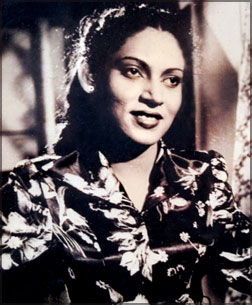 Talent, they say, is inborn rather than achieved. Similarly Sri
Lanka’s immensely talented screen queen and nightingale, Daisy Rasamma
Daniels, renowned as Rukmani Devi, was born with acting skills and a
golden voice, two qualities along with her beauty took her on an early
path to stardom. Talent, they say, is inborn rather than achieved. Similarly Sri
Lanka’s immensely talented screen queen and nightingale, Daisy Rasamma
Daniels, renowned as Rukmani Devi, was born with acting skills and a
golden voice, two qualities along with her beauty took her on an early
path to stardom.
Known as the pioneer actress of the Sinhala cinema, Rukmani breathed
life to many heart wrenching roles. She also lent her voice to a number
of gramophone numbers while contributing to a number of stage dramas and
films.
|
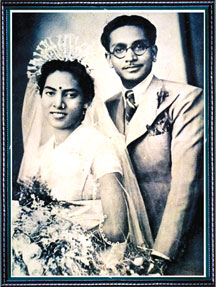
On her wedding day with husband, Eddie Jayamanna |
She was born in Ramboda in the Nuwara Eliya district on January 15,
1923. Her father, John D. Daniels, was employed in the estate while her
mother, Helen Rose Daniels, was a teacher at St. Clare’s, Wellawatte,
Methodist College, Bambalapitiya and Prince of Wales, Moratuwa. She was
the second in a family of six.
She was educated at St. Mathews’ College, Dematagoda and St. Clare’s,
Wellawatte while the family was residing in Dematagoda. She showed signs
of what was in store for her in her school days as she took part in
school plays like Sapaththu Mahannage Birinda (The Shoemaker’s wife).
Her most significant public performance was in Ramayanaya in which
she took on the role of Seetha in 1935 at the tender age of 12 years.
Walter Abeysinghe spotted the talent in the young lass and soon
introduced her to stage plays.
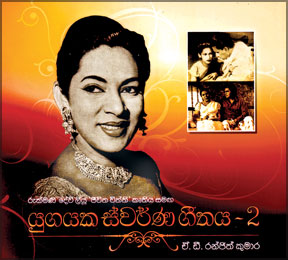
Though she took to the field at a time when women were barred from
entering the field and female characters were mostly portrayed by men,
it did not take long for her to make a name as the most sought after
actress on stage.
H.W. Rupasinghe Master, a pioneer of the Sinhala music scene,
introduced her to the industry through his duet in the evergreen number
Siri Buddha Gaya Vihare in 1939. She carved a niche as a vocalist
overnight and the song won her 10 more songs. She later went on to
become a reputed gramophone singer in the thirties and early forties.
She sang under the H.M.V label while Eddie Jayamanna, who later became
her husband, sang gramophone songs under the Colombia label.
|
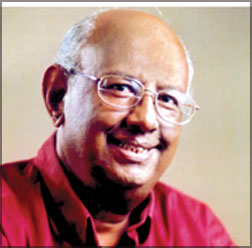
A.D. Ranjith Kumara |
Rukmani’s association with the Minerva Drama Troupe, Negombo, was her
path to the silver screen and also to marriage for she met Eddie through
the founder of the troupe, B.A.W. Jayamanna.
While acting and singing on stage productions, she was offered the
duel role of becoming the first heroine and playback singer in Sri
Lanka’s maiden talkie Kadawunu Poronduwa (Broken Promise).
|
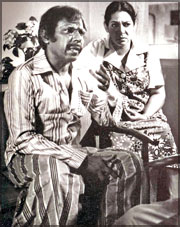
With Joe Abeywickrama in Sathara Diganthaya |
By then she had done around 800 performances of Kadawunu Poronduwa,
the play, which inspired J. Singh into bringing the stage production
onto the wide screen. The screening of the talkie took place at Kingsley
Theatre in January 21, 1947 with Rukmani starring as Ranjanie as well as
singing Jeewithaye Sama Preme Geethe, the song lyrics which were penned
by Hugo Fernando Master and music composed by Narayana Iyyer.
She played the lead role in 98 movies in a career spanning three
decades. She even acted in a Tamil film Kusuma Latha, a movie based on
B.A.W. Jayamanna’s Sanguwunu Pilithura in 1951. This was Sri Lanka’s
first Tamil film to be screened in India.
Rukmani also contributed in playback singing for films: Sandyave
Sriya for Kadawunu Poronduwa, Pinsara Mage Soyura for Kapati
Aarakshakaya, Gala Kandeni and Moranawa Preme Hade for Veradunu
Kurumanama, Mavila Penavi Rupe for Kela Handa, Pem Sihina Loke Maya for
Mathabhedaya, Suwadena Sitha for Ladalu and Doi Doi Puta for Ahasin
Polovata.
|
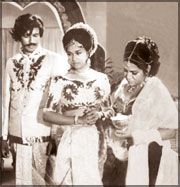
With Vijaya Kumaratunga and Malani Fonseka in Kundala Kesi |
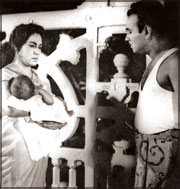
With Stanley Perera in La Dalu |
She emerged the winner at the popular star poll conducted by Dinamina
in 1956 while winning the title of best actress at the Deepashika
Festival in 1956 for her dual role in Umathu Wishwasaya. She clinched
the ANCL award for most popular singer in 1964 before winning the award
for best singer at the Presidential Awards for the song Gangata Udin
Kokku Giya for Lester James Peries’ Ahasin Polowata in 1978, just after
her death.
One of her most significant features was though she was not well
versed in the Sinhala language; she was able to pronounce the language
and even Sanskrit clearly and beautifully. It is known that she even
wrote the Sinhala sentences in her films in English and by-hearted them.
|
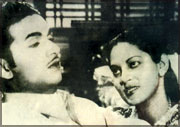
in Kela Handa |
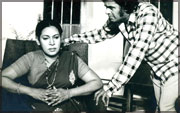
With Tony Ranasinghe in Nuwan Renu |
There are two stories behind how her widely known name of ‘Rukmani
Devi’ originated. One claims that the late Maestro H.W. Rupasinghe
created this name while the other states that Jayantha Weerasekara and
Michael Sannas Liyanage gave the name. There is also a belief that the
name started off as ‘Rukmani Wasundara’ before her father intervened and
changed it to ‘Rukmani Devi’.
Though death took her in a fateful accident at Tudella while
returning home after a musical show in Matara on October 28, 1978, her
intelligence, modesty, dedication and humble manners touched those who
knew her and made a lasting impact that transcended beyond death. She
was every heart’s delight and will continue to be remembered throughout
the years.
Rukmani Devi Filmography
1947 - Kadawunu Poronduwa
1948 - Kapati Aarakshakaya, Veradunu Kurumanama
1949 - Peralena Iranama
1950 - Hadisi Vinischaya
1951 - Sangavunu Pilithura, Kusumalatha
1952 - Umathu Wishwasaya
1953 - Kela Handa
1954 - Irangani
1955 - Mathabedaya, Perakadoru Baana
1956 - Dosthara,
1957 - Siriyalatha
1959 - Dhivya Yogaya
1960 - Kavata Andarae, Nalangana
1962 - Daskon
1963 - Mangalika
1964 - Heta Pramada Wadi, Samiya Birindage Deviyaya
1965 - Sathutai Kandulai, La Dalu
1966 - Sampatha
1967 - Hathara Kanderae, Pipena Kumudu, Magul Pooruwa, Rana Girav
1968 - Abudassa Kaalae
1969 - Para Walalu, Romeo Juliet Kathawak
1970 - Geetha, Nim Walalla
1971 - Samanala Kumariyo Samaga Api Kavadath Soorayo, Seeyae Noattuwa
1972 - Sahanaya, Hathara Watay, Weeduru Gewal, Ihatha Aathmaya
1973 - Suhada Pathum, Hondata Hondai
1974 - Dinum Kanuwa, Sagarika, Lasanda,Jeewana Ganga
1975 - Hitha Honda Minihek, Obai Mamai, Sukiri Kella, Kohoma Kiyannada,
Jeewana Geethaya, Lassana Davasak, Sadana
1976 - Nayana, Kavuda Raja, Wasana, Harima Badu Thunak, Hariyata Hari,
Unnath Daahai Malath Daahai, Onna Mamay Kella Panapi, Sardiyelge Puta,
Aadarai Mang Aadarai, Naadayo, Ran Thilaka
1977 - Sudu Paraviyo, Sri Madhara, Chin Chin Nona, Hithuwoth Hithuwamai,
Tom Pachaya Deviyani Oba Kohida, Saja, Kaathiruppen Unakkaga
1978 - Nanungal Tholan, Madhuwanthi, Kundala Kesi, Apsara, Ahasin
Polowata
1979 - Samanmali, Jeewana Kandulu, Amal Biso, Ran Kurullo,
Monarathanna,Anusha, Podi Malli, Nuwan Renu
1980 - Tak Tik Tuk, Silva, Sinhabahu
1981 - Bamba Ketu Hati, Sanasuma, Jeewanthi Sathara Diganthaya,
1982 - Thana Giravi, Sakvithi Suwaya, Sudu Ayya, Sithara
1983 - Sandamali, Hithath Hondai Wadath Hondai
1984 - Ara Soysa
|

